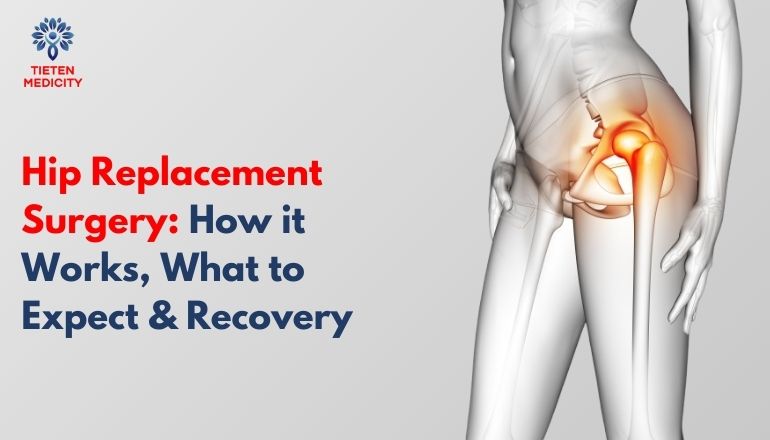- Home
- About
- Specialities
- Knee Replacement SurgeryKnee Replacement Surgery

- Doctors
- Clinics
- Resources
- Patient Services
- Contact


As the name suggests, hip replacement surgery entails the replacement of the original damaged part of the hip joint with an artificial one. This surgery is usually preferred in case of the most common Arthritis (osteoarthritis or rheumatoid arthritis) and Osteonecrosis (a condition in which a part of a bone is damaged due to lack of blood supply).
To help you understand the intricacies of this surgery, this blog seeks to explore the details on how hip replacement surgery is done, what is expected out of the procedure as well as the entire process of rehabilitating. To avoid severe complications during and after the surgery, our hip replacement surgery in Thane aids in providing effective results and care to the patients.
Hip joint surgery which is also referred to as hip arthplasty entails the removal of some parts of the hip joint and the implantation of artificial ones. The idea behind this surgical procedure relates to the remedial function to enhance mobility alongside with lessening of pain that brings relief in case all conservative measures fail.
Each method is indicated for certain symptoms in the patient and the stage of joint degeneration.
Individuals typically pursue hip replacement surgery for various reasons, including but not limited to: Individuals typically pursue hip replacement surgery for various reasons, including but not limited to
Preparation before surgery and continuous care during the recovery period is essential. Here are some steps to consider before going under the knife:
Your surgeon may provide specific instructions to follow before surgery:
Knowing what goes on during the operation can go a long way in calming down the patient.
The operation can be carried out under general anesthesia or spinal anesthesia in which only the lower part of the body is made unconscious. The anesthesiologist will tell you which choice is suitable for you.
The surgery normally takes between 1 and 2 hours on average. It includes several key steps:
The surgery for a pain-free hip is miraculous. The recovery may not be easy, but change a person’s life for the better, even from a physical peripheral. In case you are looking for the best surgeon, our hip replacement surgery in Thane is performed by highly experienced surgeons and specialists.
Post-operative experiences can vary, but here’s a general overview of what to anticipate: Post-operative experiences can vary, but here’s a general overview of what to anticipate:
It is characterized by slow healing, and the process may take from several weeks to months. Here’s a rough outline:
While hip replacement is generally safe, some possible complications can include:
You can therefore have a follow-up plan with your surgeon to deal with these risks when they arise.
Maximizing your recovery is possible with a few intentional choices:
Arthroplasty or hip replacement is a life-changing surgery for patients with severe hip pain and impaired movements. Through the surgery that involves replacing the hip joint with an artificial one, there is joint pants relief that helps patients carry out most activities with ease. Hip replacement in Thane can be considered as a constructive attempt toward a better life.
Essentially the first advantage relates to a dramatic increase in mobility and flexibility of the venture. People who have undergone hip replacement surgery in Thane witness significant changes in their mobility and daily activities with all the surgeries performed here. Such mobility not only improves the general physical well-being of the body but also the mental and emotional state of an individual.
Arthroplasty of the hip joint is a very effective intervention that can radically change your life for the better. Although the process begins with preparation and extends throughout the procedure, then to the final recovery, it is helpful to know what awaits a person, turns him or her into a humanitarian, and increases his or her feeling of control. If you are experiencing severe pain or damage in your hip, you should discuss it with your doctor and get immediate support.
© 2024, TIETEN MEDICITY. All Rights Reserved.